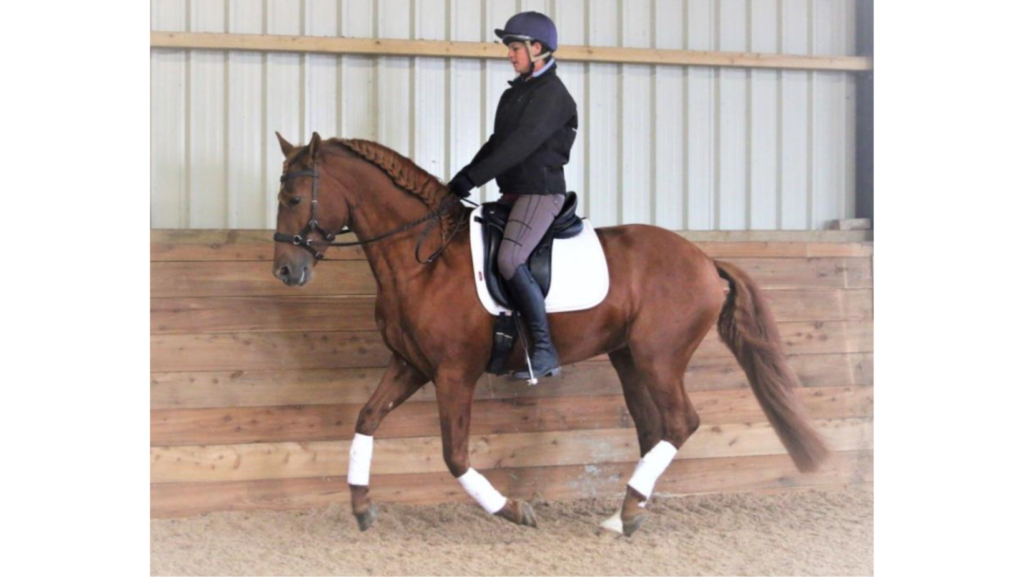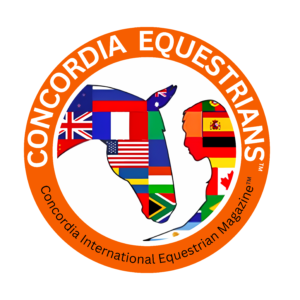WHEN TWO BITS ARE COMPULSORY BUT USING NO BIT IS BANNED!
Concordia Equestrians asked the World Bitless Association (WBA) for their view on the compulsory use of the double-bridle in Grand Prix dressage. PLEASE NOTE: Concordia Equestrians respect the rights of equestrians, who share Our Principles, to choose what they feel is best for each individual equine, be that bitted or bitless. Concordia encourages and supports scientific research and the most compassionate practices.
This article is published in Issue 7 of the CONCORDIA INTERNATIONAL EQUESTRIAN MAGAZINE – the current issue and archived issues are free to download and read online.

Photo of ‘Red’ credit Jenny Rolfe
The usage of a bit (or two, in the case of the double bridle) in combination with an aversive application of the rider’s hands – such as increasing or unrelenting pressure – that aims to force a horse into a frame, clearly indicates that the rider is using pain in the horse’s mouth to achieve their goal. Any aversive bit usage has the potential for being abusive, especially if combined with overly tight nosebands that restrict breathing and other normal bodily functions and behaviours, and has a detrimental effect on the physical and mental effect of the animal (1,2).
In a 2020 survey by the World Bitless Association, 95% of respondents believed Rollkur/LDR, tight nosebands and pressure on the head should be banned on welfare grounds, and 93% of respondents believed that modern bitless bridles should be allowed in Dressage and all horse sport (3).
In 2019, the WBA submitted evidence to the British Equestrian Federation and the FEI about the welfare issues surrounding the removal of sensory whiskers (vibrissae) for cosmetic reasons. The WBA implemented a ‘Hands OFF Whiskers’ campaign (4) and called for a global ban. From July 2021, the FEI mandated that vibrissae around the nose and eyes of the horse could not be clipped for horses in competition, on welfare grounds, due to the sensitive nature of the whiskers and their value to the horse.
The inside of the horse’s mouth has far more opportunity for sensitivity, pain, and injury from a bit, and the risk is increased when the bit is moved inside the mouth by the hands of the rider (1).
This applies even more so when the mouth is strapped tightly shut, or when the rider inadvertently balances themselves on the reins (for example when checking speed, or taking off or landing after a jump), or if the horse stumbles, or throws its head up or down to remove the pressure.
Put simply, if we can ban clipping of whiskers on welfare grounds and on evidence-based studies largely performed on rats, the option to participate in competitions with bit-free horses could certainly also be made mandatory in the FEI rules on welfare and ethical grounds.
References
1. Mellor, DJ (2020) Mouth Pain in Horses: Physiological Foundations, Behavioural Indices, Welfare Implications, and a Suggested Solution. Animals 2020, 10(4), 572; https://doi.org/10.3390/ani10040572
2. Beausoleil, N.J; Mellor, D.J. (2015): Introducing breathlessness as a significant animal welfare issue. NZ Vet J. 63(1):44-51. https://pubmed.ncbi.nlm.nih.gov/25004795/
3. World Bitless Association Survey Results (2020): https://worldbitlessassociation.org/resources/the-general-report-of-the-2020-wba-survey/
4. WBA Bitless Campaign (2019): https://worldbitlessassociation.org/…/vibrissae-hands…/
Further Reading
WBA Resources: The effect of bit-induced pain in the horse on the feelings of riders about riding (2022): https://worldbitlessassociation.org/resources/the-effect-of-bit-induced-pain-in-the-horse-on-the-feelings-of-riders-about-riding-2022/
Equine Science Talk International: Rollkur/LDR/Hyperflexion https://www.youtube.com/watch?v=Di9xSt_zELY
Taylor, J (2022): I can’t watch anymore. The case for dropping Equestrian from the Olympic Games: An open letter to the International Olympic Committee. Epona Media A/S, Copenhagen 2022.
Cook, W.R.; Kibler, M. (2019): Behavioural assessment of pain in 66 horses, with and without a bit. Equine Vet. Educ. 31(10), 551-560. doi.org/10.1111/eve.12916
Mellor, D.J. and Beausoleil, N.J. (2020): Moving beyond a problem-based focus on poor welfare towards creating opportunities to have positive welfare experiences. In: Mental Health and Well-being in Animals, 2nd Edition (Ed. Franklin D. McMillan), CAB International, Wallingford, UK, Ch 5, pp 50-66.
This article is published in Issue 7 of the CONCORDIA INTERNATIONAL EQUESTRIAN MAGAZINE – the current issue and archived issues are free to download and read online.
